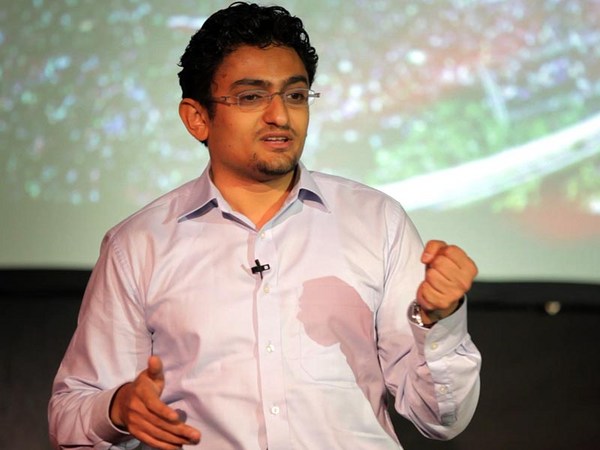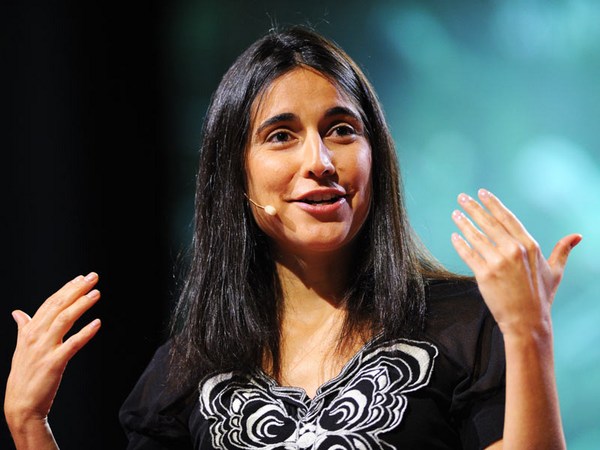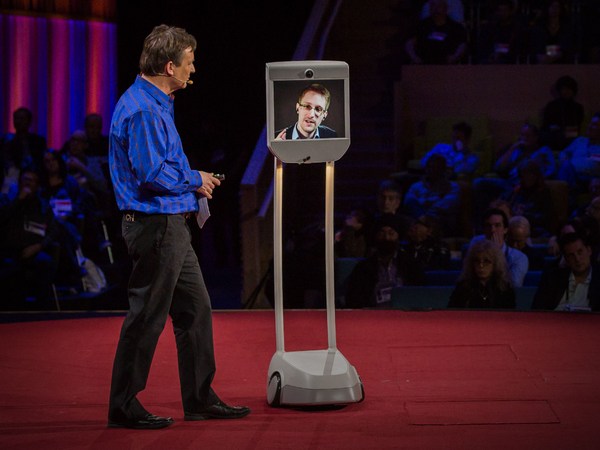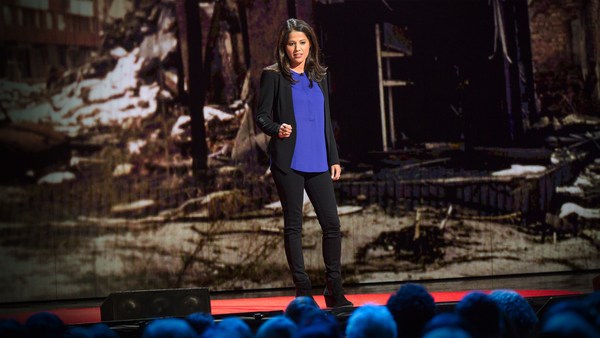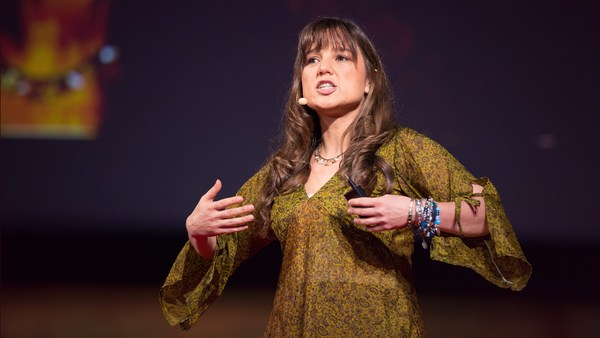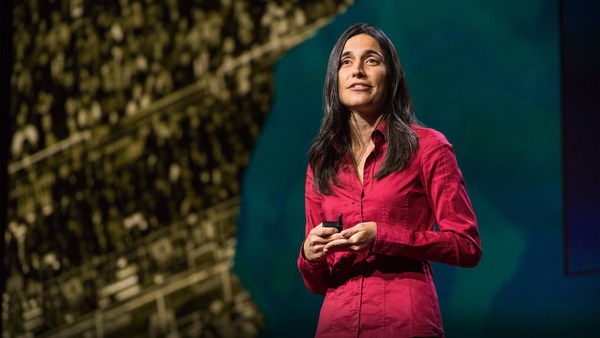Good afternoon, I'm proud to be here at TEDxKrakow. I'll try to speak a little bit today about a phenomenon which can, and actually is changing the world, and whose name is people power. I'll start with an anecdote, or for those of you who are Monty Python lovers, a Monty Python type of sketch. Here it is.
It is December 15, 2010. Somebody gives you a bet: you will look at a crystal ball, and you will see the future; the future will be accurate. But you need to share it with the world. OK, curiosity killed the cat, you take the bet, you look at the crystal ball. One hour later, you're sitting in a building of the national TV, in a top show, and you tell the story. Before the end of 2011, Ben Ali, and Mubarak, and Gaddafi would be down, and prosecuted. Saleh of Yemen and Assad of Syria would be either challenged, or already on their knees. Osama bin Laden would be dead, and Ratko Mladic would be in the Hague.
Now, the anchor watches you with a strange gaze on his face. And then, on top of it you add: "And thousands of young people from Athens, Madrid and New York will demonstrate for social justice, claiming they are inspired by Arabs."
Next thing you know, two guys in white appear, they give you the strange t-shirt, take you to the nearest mental institution. So I would like to speak a little bit about the phenomenon which is behind what already seems to be a very bad year for bad guys. And this phenomenon is called people power.
Well, people power has been there for a while. It helped Gandhi kick the Brits from India, it helped Martin Luther King win his historic racial struggle. It helped a local, Lech Walesa, to kick out one million Soviet troops from Poland, and in beginning the end of the Soviet Union as we know it.
So what's new in it? What seems to be very new, which is the idea I would like to share with you today, is that there is a set of rules and skills which can be learned and taught in order to perform successful nonviolent struggle. If this is true, we can help these movements.
Well, the first one - analytic skills. I'll try where it all started in the Middle East. And for so many years, we were living with a completely wrong perception of the Middle East. It was looking like the frozen region. Literally a refrigerator. And there were only two types of meal there. Steak, which stands for a Mubarak-Ben Ali type of military police dictatorship, or a potato, which stands for a Tehran type of theocracies. And everybody was amazed when the refrigerator opened, and millions of young, mainly secular people stepped out to do the change. Guess what - they didn't watch the demographics. What is the average age of an Egyptian? 24. How long was Mubarak in power? 31. So, this system was just obsolete, they expired. And young people of the Arab world have awakened one morning, and understood that power lies in their hands. The rest is the year in front of us. And guess what? The same Generation Y, with their rules, with their tools, with their games, and with their language, which sounds a little bit strange to me. I'm 38 now. And can you look at the age of the people on the streets of Europe? It seems that Generation Y is coming.
Now, let me set another example. I'm meeting different people throughout the world, and they are, you know, academics, and professors, and doctors, and they will always talk conditions. They will say: "People power will work only if the regime is not too oppressive." They will say: "People power will work, if the annual income of the country is between X and Z." They will say: "People power will work only if there is a foreign pressure." They will say: "People power will work only if there is no oil." And, I mean, there is a set of conditions. Well, the news here is that your skills during the conflict seem to be more important than the conditions. Namely, the skills of unity, planning, and maintaining nonviolent discipline.
Let me give you an example. I come from a country called Serbia. It took us 10 years to unite 18 opposition party leaders, with their big egos, behind one single candidate against the Balkan dictator Slobodan Milosevic. Guess what? That was the day of his defeat. You look at the Egyptians, they fight on Tahrir Square, they get rid of their individual symbols, they appear on the street only with the flag of Egypt. I will give you a counter-example. You see nine presidential candidates running against Lukashenko, you all know the outcome. So unity is a big thing. And this can be achieved. Same with planning. Somebody has lied to you about the successful and spontaneous nonviolent revolution. That thing doesn't exist in the world. Whenever you see young people in front of the row trying to fraternize with the police or military, somebody was thinking about it before.
Now, at the end, nonviolent discipline. And this is probably the game-changer. If you maintain nonviolent discipline, you'll exclusively win. You have 100,000 people in a nonviolent march, one idiot or agent-provocateur throwing a stone. Guess what takes all the cameras. That one guy. One single act of violence can literally destroy your movement.
Now, let me move to another place. It's the selection of strategies and tactics. There are certain rules in nonviolent struggle you may follow. First, you start small. Second, you pick the battles you can win. It's only 200 of us in this room. We won't call for the march of a million. But what if we organized the spraying of graffiti throughout the night, all over Krakow. The city will know. So, we pick tactics accommodated to the event, especially this thing we call the small tactics of dispersion. They're very useful in violent oppression. We are actually witnessing the picture of one of the best tactics ever used. It was on Tahrir square, where the international community was constantly frightened that, you know, the Islamists will overtake the revolution. What they organized -- Christians protecting Muslims where they are praying, a Coptic wedding cheered by thousands of Muslims, the world has just changed the picture, but somebody was thinking about this previously. So there are so many things you can do instead of getting into one place, shouting, and you know, showing off in front of the security forces.
Now, there is also another very important dynamic. And this is a dynamic that analysts normally don't see. This is the dynamic between fear and apathy on the one side, and enthusiasm and humor on another side. So, it works like in a video game. You have the fear high, you have status quo. You have the enthusiasm higher, you see the fear is starting to melt. Day two, you see people running towards the police instead of from the police, in Egypt. You can tell that something is happening there.
And then, it's about the humor. Humor is such a powerful game-changer, and of course, it was very big in Poland. You know, we were just a small group of crazy students in Serbia when we made this big skit. We put the big petrol barrel with a portrait of Mr. President on it, in the middle of the Main Street. There was a hole in the top. So you could literally come, put a coin in, get a baseball bat, and hit his face. Sounds loud. And within minutes, we were sitting in a nearby café having coffee, and there was a queue of people waiting to do this lovely thing. Well, that's just the beginning of the show. The real show starts when the police appears.
(Laughter)
"What will they do?" Arrest us? We were nowhere to be seen. We were like three blocks away, observing it from our espresso bar. Arrest the shoppers, with kids? Doesn't make sense. Of course, you could bet, they did the most stupid thing. They arrested the barrel. And now, the picture of the smashed face on the barrel, with the policemen dragging it to the police car, that was the best day for newspaper photographers that they will ever have.
So, I mean, these are the things you can do. And you can always use humor. There is also one big thing about humor, it really hurts. Because these guys really are taking themselves too seriously. When you start to mock them, it hurts.
Now, everybody is talking about His Majesty, the Internet, and it is also a very useful skill. But don't rush to label things like "a Facebook Revolution," "Twitter Revolution." Don't mix the tools with the substance. It is true that the Internet and the new media are very useful in making things faster and cheaper. They also make it a bit safer for the participants, because they give partial anonymity.
We're watching the great example of something else the Internet can do. It can put the price tag of state-sponsored violence over a nonviolent protester. This is the famous group "We are all Khaled Said," made by Wael Ghonim in Egypt, and his friend. This is the mutilated face of the guy who was beaten by the police. This is how he became known to the public, and this is what probably became the straw that broke the camel's back.
But here is also the bad news. The nonviolent struggle is won in the real world, in the streets. You will never change your society towards democracy, or, you know, the economy, if you sit down and click. There are risks to be taken, and there are living people who are winning the struggle.
Well, the million-dollar question. What will happen in the Arab world? And though young people from the Arab world were pretty successful in bringing down three dictators, shaking the region, kind of persuading the clever kings from Jordan and Morocco to do substantial reforms, it is yet to be seen what will be the outcome. Whether the Egyptians and Tunisians will make it through the transition, or this will end in bloody ethnic and religious conflicts, whether the Syrians will maintain nonviolent discipline, faced with a brutal daily violence which kills thousands already, or they will slip into violent struggle and make ugly civil war. Will these revolutions be pushed through the transitions and democracy or be overtaken by the military or extremists of all kinds? We cannot tell. The same works for the Western sector, where you can see all these excited young people protesting around the world, occupying this, occupying that. Are they going to become the world wave? Are they going to find their skills, their enthusiasm, and their strategy to find what they really want and push for the reform, or will they just stay complaining about the endless list of the things they hate? This is the difference between the two paths.
Now, what do the statistics have? My friend Maria Stephan's book talks a lot about violent and nonviolent struggle, and there are some shocking data. If you look at the last 35 years and different social transitions, from dictatorship to democracy, you will see that, out of 67 different cases, in 50 of these cases it was nonviolent struggle which was the key power. This is one more reason to look at this phenomenon, this is one more reason to look at Generation Y. Enough for me to give them credit, and hope that they will find their skills and their courage to use nonviolent struggle and thus fix at least a part of the mess our generation is making in this world.
Thank you.
(Applause)
